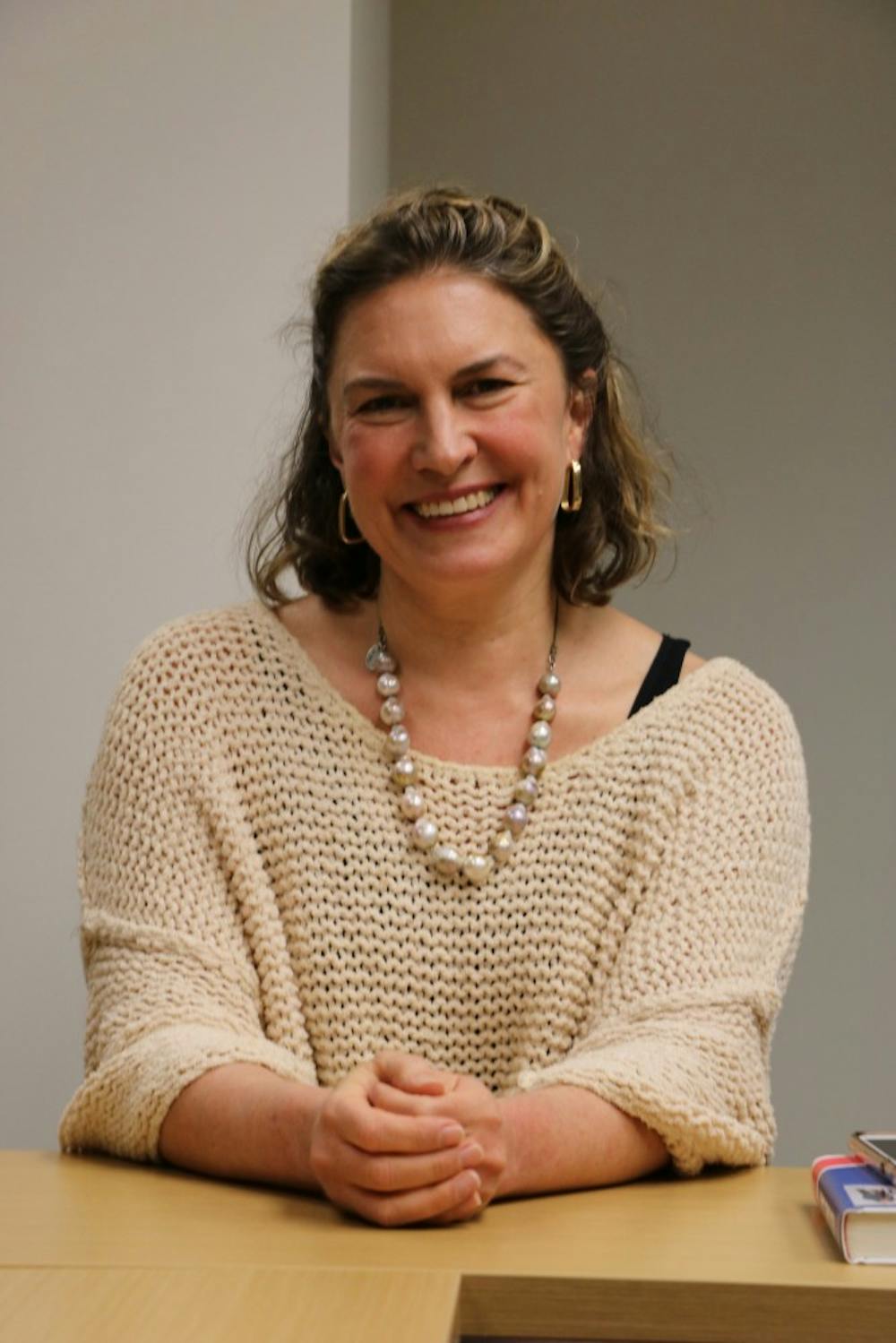On her days off, Karen Zacarías spends most of her time with her kids, reading and walking her dogs. On days when she’s working, she is in rehearsals for her latest play, writing and rewriting and staying up all night talking with producers and directors.
“There are very on days and there are days where I’m in my sweats,” Zacarías said. “Too much of either one is hard.”
Most recently, though, Zacarías has been hard at work as one of six inaugural fellows for AU's Sine Institute of Policy and Politics. A D.C. based playwright, Zacarías has written around 20 plays and is known as one of the most produced playwrights in the United States.
“I don’t know the answers, I’m not telling the audience what I think to be true,” Zacarías said about her plays. “What I’m hoping is that we get to explore a question together and that we can come up with different answers.”
The Sine Institute launched in September as part of a university initiative to “uncover new policy solutions and problem-solving methods” with experts in politics, journalism, government, nonprofits and more, according to the institute’s website.
As a fellow, Zacarías taught various seminars throughout the spring semester, from late February to mid-April. The sessions have touched on everything from finding inspiration to constructing a narrative.
“Being the Sine Institute’s inaugural artist fellow was a wonderful surprise,” Zacarías said. “The idea of whose story is being told and what narrative we’re following is really at the center of American politics. I thought it was an inspired choice for the Sine Institute to have one of the fellows be an artist.”
Vicky Wilkins, the dean of the School of Public Affairs, said that having a broad range of voices from different professions is the key to making better policies.
“We really wanted to bring voices from all sectors, including the arts, so that we’d have the opportunity to learn from experiences in each sector to try and propel policy forward,” Wilkins said. “I think all of those things are a part of what an institute should be doing. All these things we’ve been up to go to the DNA of what we are as the School of Public Affairs.”
Zacarías’ award-winning plays include “The Book Club,” “Just Like Us,” “Legacy of Light” and “Native Gardens.” While there’s a wide range of themes present in her work, most of the plays aim to understand the human condition.
“I always knew I wanted to be a writer, but I was also very interested in global affairs,” Zacarías said. “My father’s from Mexico, my mother’s from Denmark, my grandfather’s from Lebanon, so I came from an international family. The ideas of borders and bridges [were] always really interesting to me.”
Zacarías studied international relations at Stanford University in 1991 and received an MFA in creative writing from Boston University in 1995. After graduation, Zacarías started D.C.’s Young Playwrights Theater with a goal to bring arts education to young people in the District.
“Every kid deserves to have access to the arts, and of course it’s in public schools and underserved communities where it gets cut first,” Zacarías said. “But it’s not a luxury, it’s a necessity.”
Giving a voice to overlooked groups has always been Zacarías’ mission. In 2012, she helped found the Latinx Theatre Commons, which was created as a way for the Latinx theater community to come together and make change within their industry. The commons has three main goals: to create plays, have get-togethers and to create scholarship.
In a world where people are constantly inundated with news, media and information, Zacarías said she sees theater as a space where human connection can thrive.
“Theater is more relevant than it’s ever been,” she said. “The idea of being alive in a room with other people and experiencing it is becoming a much more unique and vital component. It’s nourishing people in a way that they took for granted before.”
One of her most recent seminars, “Breaking the Wall: The Power of Latinx Narrative,” was held on April 4. For an hour and a half, Zacarías facilitated a conversation on “taking on an art form and trying to use it in a political way.” Students and faculty came together to listen and discuss their own experiences with their identities.
Senior Julia Harris, a theater arts and psychology major who attended the seminar, called it “an empowering thing.” Two local high school students, Ally Cruz-Flores from School Without Walls and Vanessa Ramon-Ibarra from Woodrow Wilson High School were also in attendance and left the event feeling motivated.
“I’m leaving this room thinking, ‘I’m gonna go home and fix something,’’’ Ramon-Ibarra said.
Cruz-Flores agreed, saying, “this wasn’t just about empowerment for Latinos, it was about empowerment in who you are.”
While Zacarías has done a lot of work to promote diversity in the theater community, she said there’s still more work to be done.
“There are really interesting people coming up behind me, and I hope they get their voices heard,” Zacarías said. “I hope I get to continue to share my stories and let other people come in and share their stories too. There’s a hunger for this, there’s a desire to hear stories from a different point of view.”
mgoodman@theeagleonline.com
This article originally appeared in The Eagle's April 2019 print edition.





